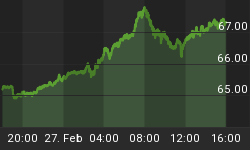- The Federal Reserve is expected to alter their forward policy guidance to support the economy as early as this week.
- If the Fed emphasizes that they intend to keep interest rates low, it could be interpreted by the markets as a positive for stocks and risk-taking in general.
- With the Fed on deck, and given the S&P 500 recaptured an important support level, stocks could experience better than expected outcomes this week.
Guidance Takes Center Stage

The Fed has signaled in recent weeks that the threshold for altering their bond tapering schedule is high. Therefore, the market expects another round of tapering this week. The focus has shifted to forward guidance. In the current economic environment, forward guidance is the Fed's way of signaling to the markets how long they expect to keep interest rates low. Forward guidance has been tied almost exclusively to the unemployment rate; that may change Wednesday. From MarketWatch:
The Fed's current pledge is to hold rates steady until "well past" the point when the unemployment rate falls below 6.5%. But the unemployment rate has steadily dropped over the past year, before ticking up slightly to 6.7% in February. "It is time to seriously rethink that 6.5% unemployment target because we are so close to it," said former Fed governor Randall Kroszner in an interview with MarketWatch. Yellen has signaled that she would be comfortable with this change, analysts said, when she told lawmakers last month that the unemployment rate did not fully summarize the health of the labor market.
Vulnerabilities Call For Flexibility
While stocks staged an impressive rally Monday, this week's stock market outlook video covers numerous observable signs of vulnerability. While vulnerable does not mean bearish, it speaks to the need to pay close attention this week from a risk management perspective.
Keeping An Ear To The Ground
It is always a good idea to review recent writings from The Wall Street Journal's Jon Hilsenrath prior to a formal Fed statement. The excerpt below also points to guidance being the focus of this week's Fed statement. From The Wall Street Journal:
New York Fed President William Dudley said on March 6 he thought the Fed should revise the guidance with the jobless rate so close to 6.5%. It was 6.6% in January. With Friday's report that it rose to 6.7% in February, that takes a little pressure off officials to change their guidance right away. Still, Mr. Dudley said he believed March was the right time to strike new chords on the interest rate outlook. "My personal opinion is 6 ½% is not providing a lot of value right now in terms of our communications," Mr. Dudley said. "So my personal view is this is probably a reasonable time to revamp the statement to take out that 6 ½% threshold because it's not really providing any great value. I'd rather do it before I reached that threshold." To be clear, Mr. Dudley remains strongly supportive of Fed efforts to spur stronger growth and bring down unemployment. He said Thursday he was comfortable with the market's view the Fed wouldn't start raising short-term interest rates until mid- to late-2015.
Investment Implications - Key Support Still In Play
Just as we noted vulnerable does not mean bearish, the incremental risk-reduction steps we took last week are a form of risk management, not a shift to the bearish camp. The comments from Friday's article still apply:
Our core positions continue to be U.S. stocks (SPY) and technology stocks (QQQ). Last week our allocation to stocks contracted and our cash position expanded. The market remains in a more vulnerable state, but bearish conviction is not yet strong enough to carry the day, which can be seen in the flattish nature of the S&P 500's 50-day moving average. The market's current profile requires a high degree of flexibility. With a Fed meeting on this week's docket, we must be willing to increase or decrease our equity exposure based on the incoming data and evidence.
The chart below shows the S&P 500 making a stand near a key range. Also note, the slope of the 50-day moving average is trying to turn back up in a bullish manner, which reflects improving investor sentiment relative to last week.

Monday's return to a risk-on bias allowed us to take a small incremental step on the growth side of the portfolio via the S&P 500 Equal-Weight ETF (RSP). If conditions continue to improve, we will further reduce our cash holdings and add to our stock positions.















